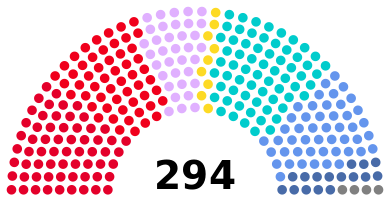1942 North French legislative election
|
| ||||||||||||||||||||||||||||||||||||||||||
| ||||||||||||||||||||||||||||||||||||||||||
|
All 294 in the Constituent Assembly 147 seats needed for a majority | ||||||||||||||||||||||||||||||||||||||||||
| Turnout | 74.3% | |||||||||||||||||||||||||||||||||||||||||
|---|---|---|---|---|---|---|---|---|---|---|---|---|---|---|---|---|---|---|---|---|---|---|---|---|---|---|---|---|---|---|---|---|---|---|---|---|---|---|---|---|---|---|
|
This lists parties that won seats. See the complete results below.
| ||||||||||||||||||||||||||||||||||||||||||
Legislative elections were held in North France on 25 October 1942. They were the first elections to be held in North France after the Great War, and were to elect members for a Constituent Assembly to draft a constitution for the Kingdom of France. A total of 294 seats were elected through proportional representation; women were allowed to vote and run for national election for the first time. Several overseas departments of France did not hold elections, as they remained under military occupation by the League of Nations.
The election resulted in a narrow victory for the Popular Democratic Movement, a Christian democratic and pro-monarchist party, who together with the Orléanist bloc, Radical-Republicans, and French Party of Liberty formed a government which approved the restoration of the Monarchy of France, confirming the ascension of Henry VI. The election was highly controversial, with the referendum on the French monarchy passing by only 51.32%. The French Communist Party and the French Section of the Workers' International, who came in second and third respectively, alleged voter suppression due to the influence of Allied occupation forces on the election. During the Pike Commission of the 1970s, it was revealed that the Royal Intelligence Agency and Federal Intelligence Service supplied funds to the Popular Democratic Movement and conducted covert operations to discredit the French Communist Party; the FIS conversely alleged that the United Commonwealth funded Communist cells in North France to unite the country with South France.
Campaign
After the Great War, the Armistice of Vichy, and the post-war division of France into Allied occupation zones, formal elections were held in the Kingdom of France in accordance with the occupation statue and the request of Henry VI of France after the Orléans Restoration of 1940. Elections were to be held in the Anglo-German occupation zones in the northern areas of Metropolitan France while separate elections were to be held in South France in the Landonist occupation zone. By the time of the 1942 legislative elections, most French political parties were committed towards democracy, though they disagreed on what type of democracy North France should be.
The Popular Democratic Movement (MDP) lead by Maurice Roussel supported a market economy, a non-denominational Christian democracy, and a constitutional monarchy, supporting the re-establishment of the Monarchy of France having grown disillusioned with French republicanism before the war in his political career. The MDP took inspiration from the Kingdom of Sierra and the United Kingdom in terms of the type of political system, monarchy, and role for the latter institution would be in the French government and society. The MDP gained the support of the Orleanists, supporters of House of Orléans and the re-establishment of the monarchy.
Pierre Rochet, General Secretary of the French Communist Party (PCF), campaigned for a united, socialist, democratic French republic. Rochet denounced the forced merger of the southern branch of the PCF and other socialist parties to create the Socialist Unity Party of France (both in the Landintern occupation zone) in South France. In an effort to broaden the party's appeal, Rochet had altered the party's course away from a working class advocacy group in the French Third Republic to a unified popular front comprising of Landonists, other communists, socialists, progressives and other leftists and republicans. Rochet also moderated the party's ideological stance and position in order to maintain a presence in post-war politics, viewing it as necessary given the political climate of North France and the hostility towards communism by the Western Bloc as a result of the Cold War. The French Section of the Workers' International (SFIO) lead by Guy Mollet supported this effort, though contested the election by running their own candidates while being open to joining the PCF in a coalition government in the event they won enough seats in the Constituent Assembly.
